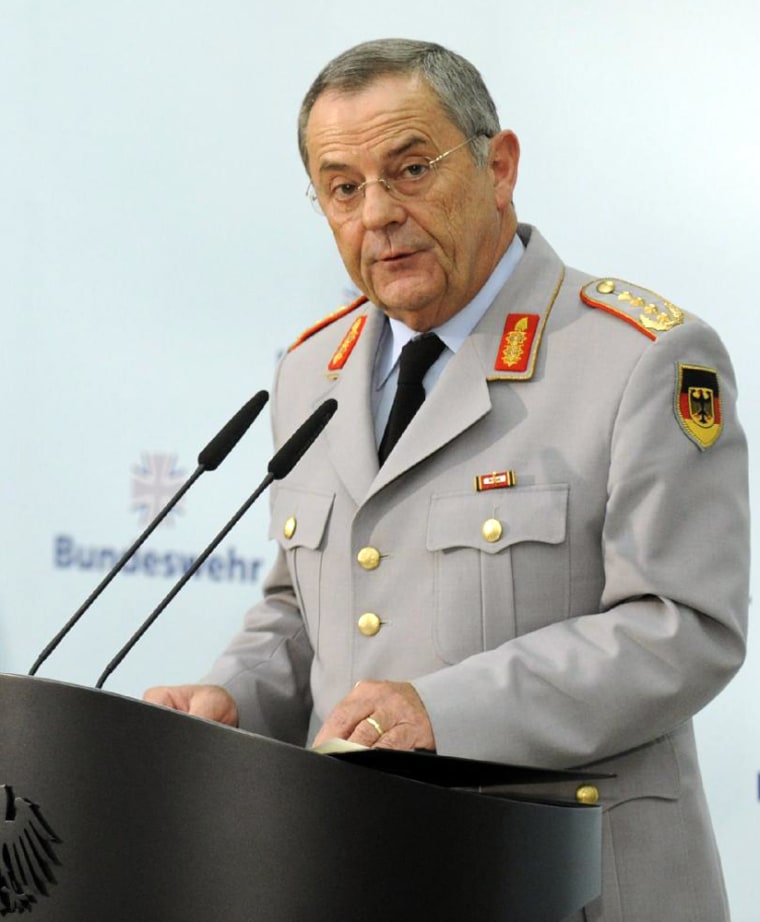A top German general said Thursday that a NATO investigation of an airstrike against a pair of hijacked Afghan tanker trucks showed the attack was appropriate even though it led to civilian casualties.
Gen. Wolfgang Schneiderhan, who is the general inspector of the German army, also said that the exact death toll could no longer be confirmed.
James Appathurai, a NATO spokesman in Brussels, said he could not comment on the report.
In Washington, Defense Department press secretary Geoff Morrell told a Pentagon press conference later Thursday that he couldn't comment because as far as he knows the investigation is not yet complete.
Schneiderhan told reporters he had read the classified report prepared by the NATO-led International Security Assistance Force on the airstrike, which was called by a German colonel against the trucks on Sept. 4 because he feared that insurgents would use them to mount a suicide attack on his troops.
Germany has 4,200 troops serving in northern Afghanistan and 35 have been killed. Polls over recent months have shown that more than half of Germans now oppose the mission.
The top U.S. and NATO commander in Afghanistan, Gen. Stanley McChrystal, appointed a Canadian major general to lead the investigation along with officers from the U.S. Air Force and German military.
McChrystal ordered commanders in June to be sure any targets were clear of civilians before calling in an airstrike, hoping to reduce the growing number of Afghan civilian deaths, which have damaged the credibility of international troops.
'Great, great tragedy'
French Foreign Minister Bernard Kouchner said the airstrike was "a big mistake." EU External Relations Commissioner Benita Ferrero-Waldner called the incident "a great, great tragedy."
Schneiderhan said the report was classified but "according to my evaluation, the air strike was appropriate."
"I have no reason to doubt that the German soldiers did the right military move in view of the difficult situation," he said, adding that the report concluded too much time had gone by to confirm the exact number of deaths and injuries or discern how many were civilians.
The report did confirm that "uninvolved people" were killed, he said.
"According to the report, between 17 and 142 persons died or were injured," Schneiderhan said, adding that local leaders quoted in the report had given the number of injuries and deaths as between 30 and 40.
NATO has said that a preliminary review found that it was likely that civilians had been killed and wounded, along with insurgents.
A critic of airstrikes
Schneiderhan defended German Col. Georg Klein, who gave the disputed order, and said his military evaluation at the time had been right.
"I can very well understand that the night of Sept. 4 presented itself in such way for Col. Klein, that it seemed like there were no uninvolved persons at the scene."
Germany had been one of the harshest critics of using airstrikes as part of the mission. But a recent jump in attacks on their troops led the government to change the army's rules of engagement, letting open fire instead of waiting to be attacked.
Germany was criticized by some of its NATO partners for calling in the strike by a U.S. jet and for initially insisting that it appeared only militants were among the dozens who died.
For years, German troops have been largely shielded from the worst of suicide or roadside attacks. But with the Taliban gaining influence in the previously peaceful northern regions where the Germans are stationed, the fighting in Afghanistan has come to them.
One major problem has been how to refer to the mission. Given Germany's history, it is constitutionally forbidden to participate in any war, unless as an act of defense.
